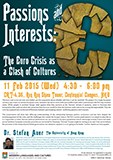Abstract:
The euro crisis is not yet over and neither are the arguments about whether and how it can be resolved. The project of a single European currency was meant to cement European unity. Instead it has led to more strife and conflict both within and between the EU’s key member states. While people in southern Europe rebel against what they perceive as the ‘German’ dictate of austerity, voters in Germany feel betrayed by their political elites who promised that the euro would be what the German mark used to be: strong and dependable. Thus the crisis has exposed and reinforced differences between participating nations’ conflicting passions and interests.
This presentation will show how differing understandings of the relationship between politics, economics and law have shaped the (mis)management of the crisis, and the challenges this creates for Europe’s future. The EU’s current predicament is as simple to describe as it is impossible to solve: German political preferences are not suited for Europe’s peripheries (which alarmingly include France and Italy), just as Southern European economic priorities are not suited for Germany. ‘German’ Europe might be coming to an end, if we are to believe the promises of the newly elected Greek government, but whatever replaces it is not going to be better. Further clashes are inescapable.
Bio:
Stefan Auer is Associate Professor and Director of European Studies at the University of Hong Kong. Concurrently, he holds the Jean Monnet Chair in EU Interdisciplinary Studies at La Trobe University in Melbourne, where he worked between 2006-2013. His book Liberal Nationalism in Central Europe (Routledge 2004) won the prize for Best Book in European Studies (2005) with the University Association for Contemporary European Studies. His recent publications include Whose Liberty is it Anyway? Europe at the Crossroads (Seagull, 2012) and ‘The End of the European Dream’, Transit: Europäische Revue (No 44, 2013), which was translated into Bulgarian, German, Russian and Slovenian. He also writes occasional opinion pieces for The South China Morning Post, The Australian newspaper and comments on European politics in the media, such as ABC News 24 (based in Melbourne), CNBC and RTHK (based in Hong Kong).

